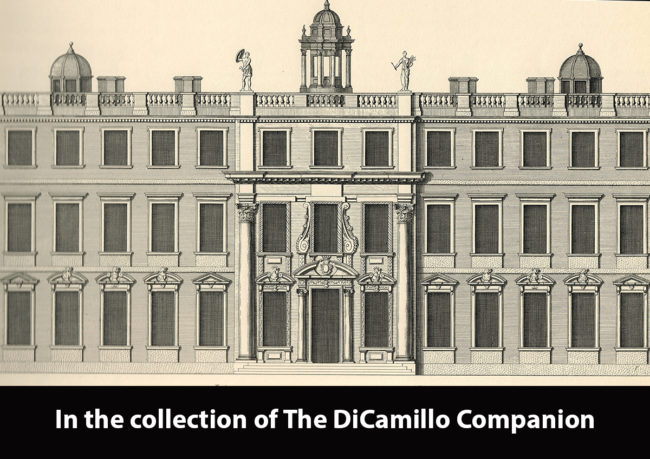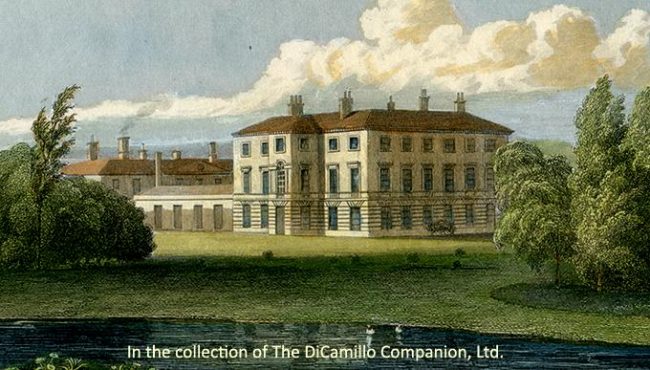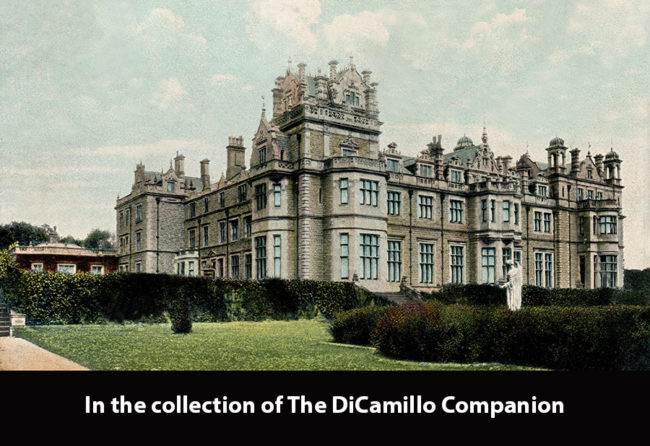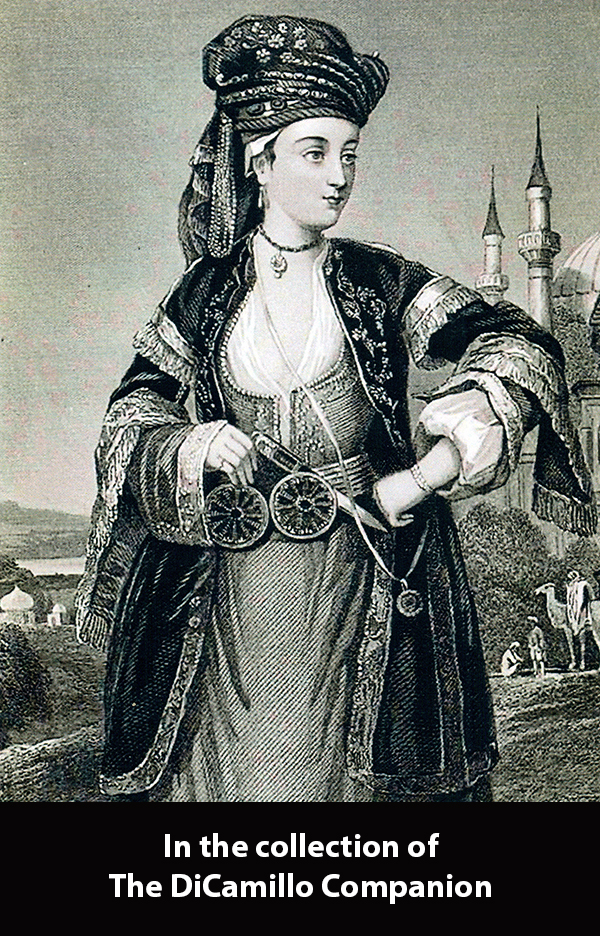
The first house (destroyed 1745) from the 1715 edition of "Vitrivius Britannicus"

An 1829 hand-colored engraving of the second house (demolished 1868) from "Jones' Views of Seats"

The current (third) house from a 1913 postcard

Lady Mary Wortley-Montagu in Oriental dress from a 19th century engraving
Earlier Houses: The first house, built 1683-85 for the 4th Earl of Kingston, was destroyed by fire in 1745 and replaced by a much smaller brick house, built between 1767 and 1771 for the 2nd Duke of Kingston; this house was demolished in 1868 and replaced, 1864-75, by the current (third) house, built for the 3rd Earl Manvers.
Built / Designed For: The 3rd Earl Manvers (current house)
House & Family History: From 1685 until 1687 the first Thoresby Hall was remodeled, probably to the designs of William Talman, by master mason Benjamin Jackson, plasterer Edward Goudge, carvers John Nost and C.G. Gibber, painters Louis Laguerre and Antonio Verrio, and gilder Rene Cousin. The current house (the third) was built of Steetley stone in an Elizabethan style to the designs of Anthony Salvin, one of England's great 19th century architects. This house was sold from the estate (due to subsidence) to the Coal Board in 1980. The Coal Board stripped Thoresby of its contents and sold it in 1990 for use as a hotel, which it remains today. In the early 21st century Hugh Matheson built a new Thoresby Halll, in the style of a Palladian villa, as his private residence. The new house is half-a-mile south of the the big house, on the south side of Thoresby Lake on estate land owned by the Matheson family. The famous Lady Mary Wortley-Montagu (née Pierrepont) was raised at the first Thoresby Hall. Lady Mary (see “Images” section) is mostly remembered today as a writer and poet, but, as far as we're concerned, her most important contribution to European culture was the introduction of the smallpox inoculation to Western medicine. Lady Mary had considerable first-hand experience with the deadly disease, which consistently ravaged Europe (roughly 60% of Europeans caught the disease and 20% died of it). Her brother died at the age of 20 from smallpox, and, in December of 1715 she contracted the disease herself. Lady Mary wasn’t expected to live, but she pulled through and was left, like most surviving victims, with a pockmarked face. In 1716, Lady Mary’s husband, Edward Wortley-Montagu, was appointed British ambassador to the Ottoman Empire. Mary and her two young children accompanied Edward to Constantinople. After witnessing the Turkish-developed smallpox variolation being administered during her travels in the Ottoman Empire, Lady Mary had her eldest child, her nearly five-year-old son, Edward, successfully inoculated in March of 1718. On her return to England, Lady Mary enthusiastically promoted the procedure, but encountered great resistance from the medical establishment, who viewed it as a suspicious foreign (in this case, heathen) treatment. Using her connections at court, Lady Mary convinced George I to allow the Princess of Wales’s two daughters to undergo the variolation, which successfully protected them from contracting the disease. Further testing on prisoners was successful, which led, over time, to an acceptance of the procedure in Britain. Lady Mary’s variolation was replaced in the 1790s by Edward Jenner’s safer technique of vaccination using cowpox pus.
Collections: A sale of contents of Thoresby Hall was held on May 31 and June 1 and 2, 1989 by Sotheby's.
Comments: Mark Girouard, writing in "The Victorian Country House," calls Thoresby "Salvin's grandest house."
Architect: John Carr
Date: 1789-1804Architect: John Carr
Date: 1767-71Architect: William Talman
Date: 1685-87Architect: Anthony Salvin
Date: 1864-75Vitruvius Britannicus: C. I, pls. 90, 91, 1715. C, III, pls. 81, 82, 1725. C, V, pls. 11-13, 1771.
John Bernard (J.B.) Burke, published under the title of A Visitation of the Seats and Arms of the Noblemen and Gentlemen of Great Britain and Ireland, among other titles: 2.S. Vol. I, p. 128, 1854.
John Preston (J.P.) Neale, published under the title of Views of the Seats of Noblemen and Gentlemen in England, Wales, Scotland, and Ireland, among other titles: Vol. III, 1820.
Country Life: CLXV, 2082, 1979. CLXVI, 18, 323, 1979.
Title: Biographical Dictionary of British Architects, 1600-1840, A - HARDBACK
Author: Colvin, Howard
Year Published: 2008
Reference: pg. 226
Publisher: New Haven: Yale University Press
ISBN: 9780300125085
Book Type: Hardback
Title: Guide to Vitrivius Britannicus
Author: Breman, Paul; Addis, Denise
Year Published: 1972
Reference: pg. 70
Publisher: New York: Benjamin Blom, Inc.
ISBN: NA
Book Type: Hardback
Title: Victorian Country House, The
Author: Girouard, Mark
Year Published: 1990
Reference: pg. 421
Publisher: New Haven: Yale University Press
ISBN: 0300034725
Book Type: Softback
Title: Biographical Dictionary of British Architects, 1600-1840, A - SOFTBACK
Author: Colvin, Howard
Year Published: 1995
Reference: pg. 951
Publisher: New Haven: Yale University Press
ISBN: 0300072074
Book Type: Softback
Title: English Country House From the Archives of Country Life, 1897-1939, The
Author: Hall, Michael
Year Published: 1994
Publisher: London: Mitchell Beazley
ISBN: 1857325303
Book Type: Hardback
Title: Disintegration of a Heritage: Country Houses and their Collections, 1979-1992, The
Author: Sayer, Michael
Year Published: 1993
Publisher: Norfolk: Michael Russell (Publishing)
ISBN: 0859551970
Book Type: Hardback
House Listed: Grade I
Park Listed: Grade I
Current Seat / Home of: Hugh Matheson, seated at the 21st century Thoresby Hall.
Past Seat / Home of: SEATED AT EARLIER HOUSES: William Pierrepont, 4th Earl of Kingston-upon-Hull, 17th century; Evelyn Pierrepont, 2nd Duke of Kingston-upon-Hull, Marquess of Dorchester, Viscount Newark, and Baron Pierrepont, 18th century. SEATED AT CURRENT HOUSE: Sydney William Herbert Pierrepont, 3rd Earl Manvers, until 1900.
Current Ownership Type: Corporation
Primary Current Ownership Use: Hotel
Ownership Details: The rebuilt Victorian house and a few acres of grounds are today the Thoresby Hall Hotel, owned by Warner Holidays group. The Matheson family still own the surrounding estate.
House Open to Public: By Appointment
Phone: 01623-821-000
Fax: 01623-821-069
Website: https://www.warnerleisurehotels.co.uk
Historic Houses Member: No